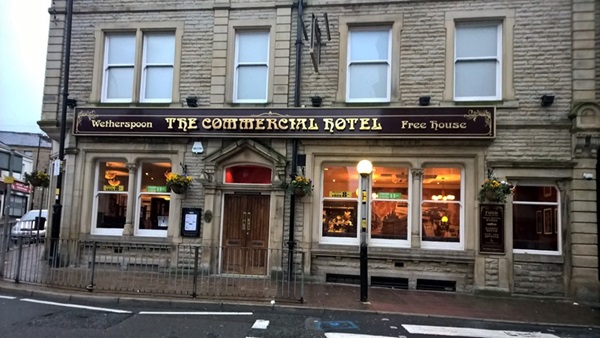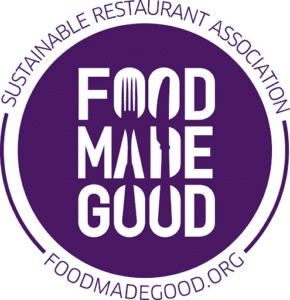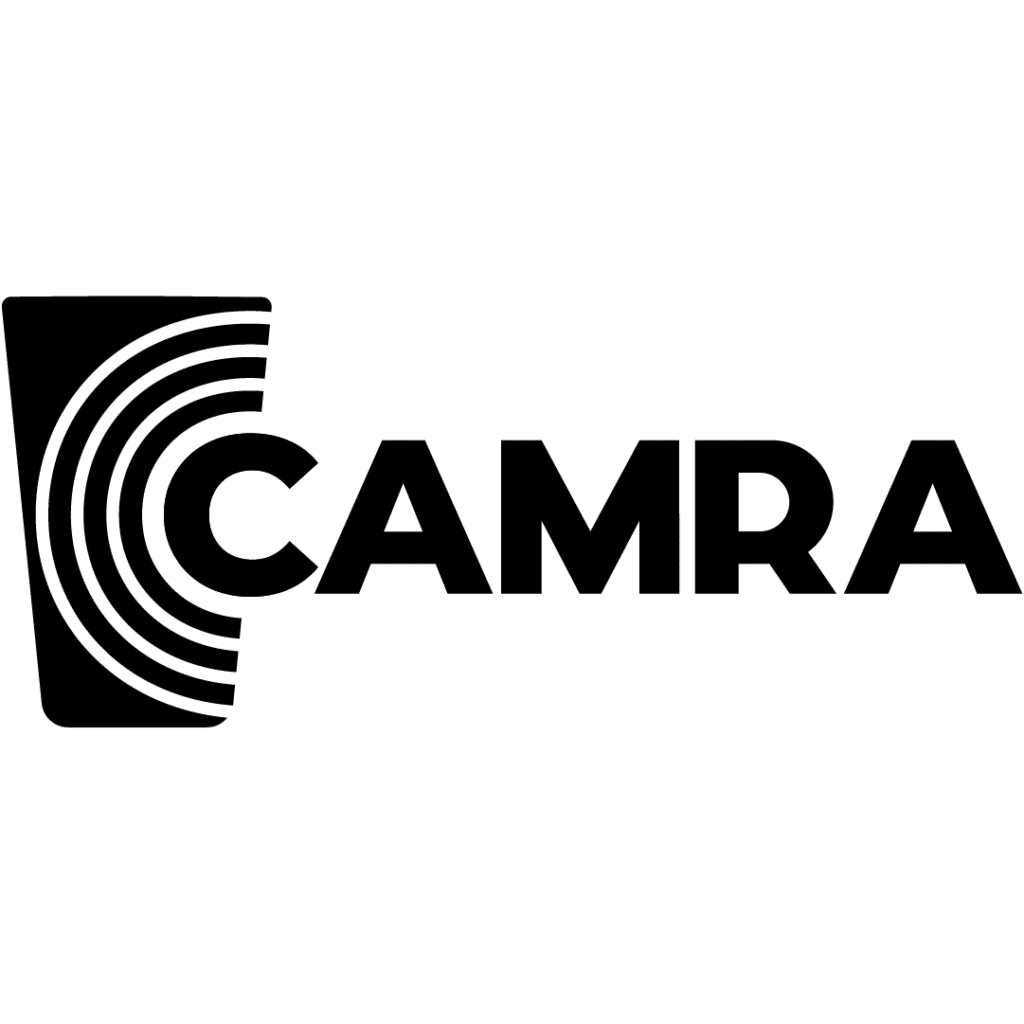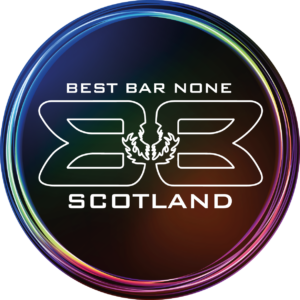Pub history
The Commercial Hotel
This landmark corner building had been the Regency Bar since 1977. Before then, it was the Commercial Hotel for almost 100 years. Built in 1881, it was the second Commercial Hotel on this site. The first was an early 19th-century coaching inn. In 1848, two coaches called at the hotel daily, except Sundays – the Invincible (for Burnley and Preston) and the Shuttle (for Blackpool).
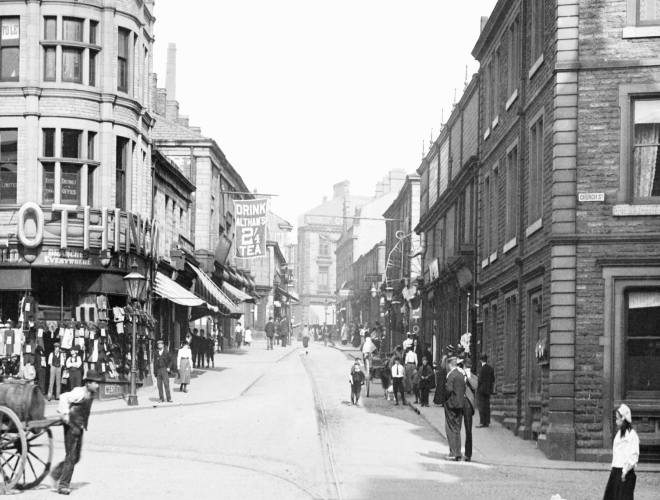
1 Church Street, Accrington, Lancashire, BB5 2EN
This landmark corner building had been the Regency Bar since 1977. Before then, it was the Commercial Hotel for almost 100 years. Built in 1881, it was the second Commercial Hotel on this site. The first was an early 19th-century coaching inn. In 1848, two coaches called at the hotel daily, except Sundays – the Invincible (for Burnley and Preston) and the Shuttle (for Blackpool).
Photographs and text about the Regal cinema.
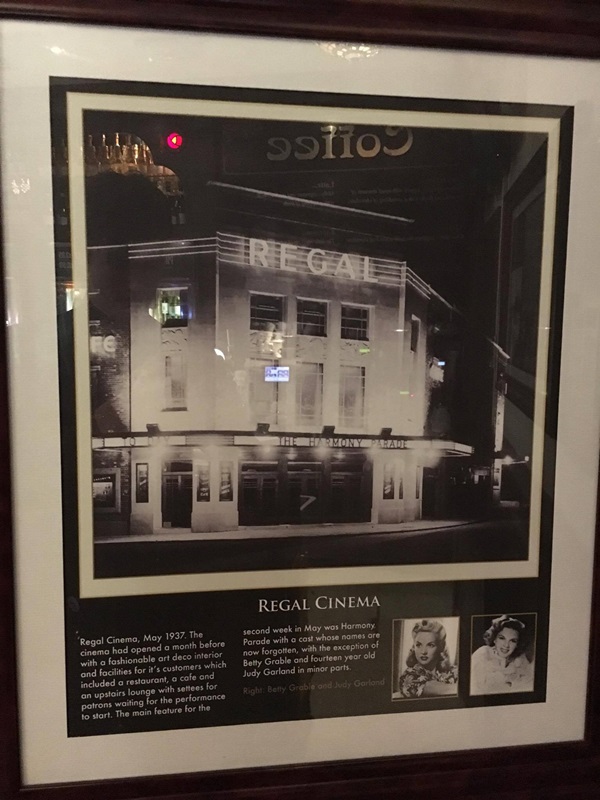
The text reads Regal Cinema, May 1937. The cinema had opened a month before with a fashionable Art Deco interior and facilities for its customers which included a restaurant or cafe and an upstairs lounge with settees for patrons waiting for the performance to start. The main feature for the second week in May was Harmony Parade with a cast whose names are now forgotten, with the exception of Betty Grable and fourteen year old Judy Garland in minor parts.
A photograph and text about Blackburn Road.
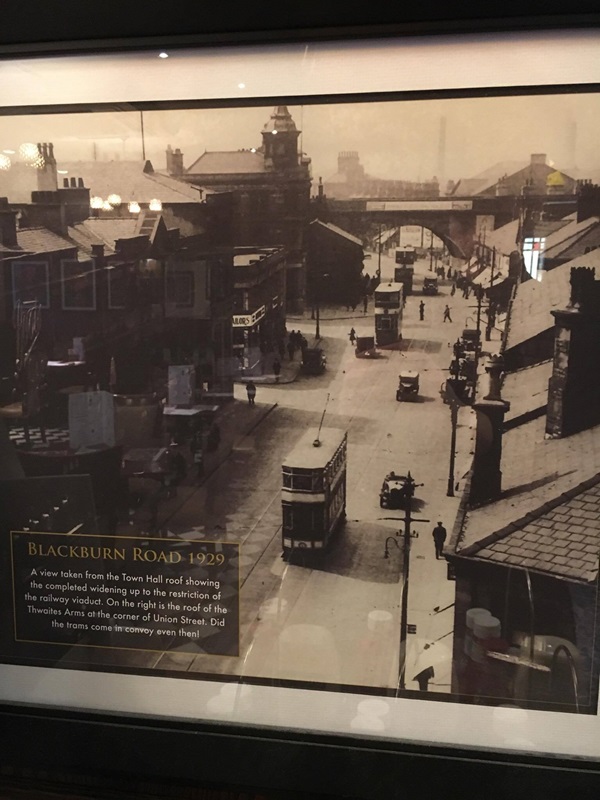
The text reads: A view taken from the Town Hall roof showing the completed widening up to the restriction of the railway viaduct. On the right is the roof of the Thwaites Arms at the corner of Union Street. Did the trams come in convoy even then!
A photograph and text about Oakfield House.
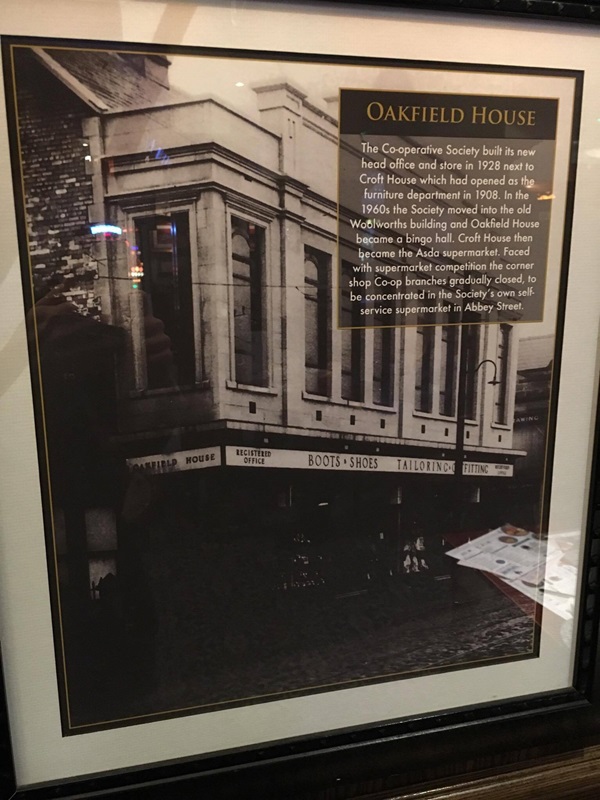
The text reads: The Co-operative Society built its new head office and store in 1928 next to Croft House which had opened as the furniture department in 1908. In the 1960s the society moved into the old Woolworths building and Oakfield House became a bingo hall. Croft House then became the Asda supermarket. Faced with supermarket competition the corner shop Co-op branches gradually closed, to be concentrated in the society’s own self-service supermarket in Abbey Street.
A photograph and text about Empire Cinema.
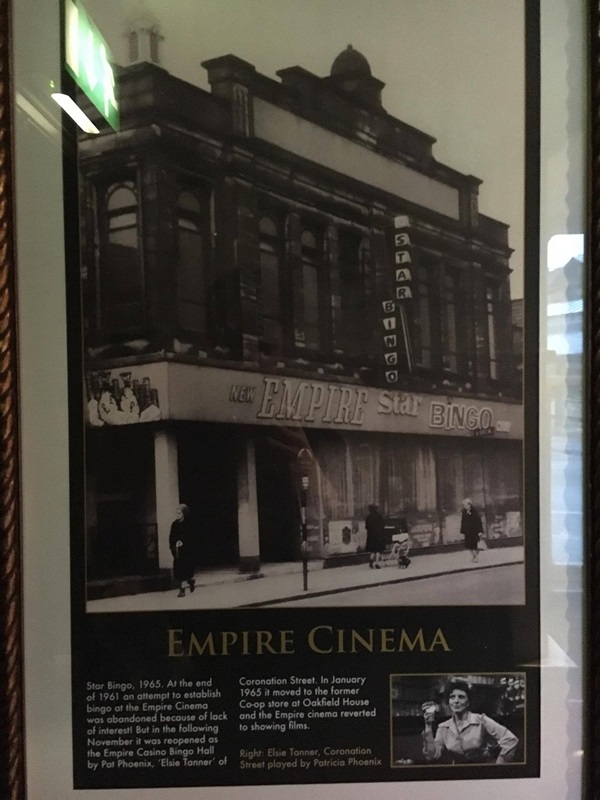
The text reads: Star Bingo 1965. At the end of 1961 an attempt to establish bingo at the Empire Cinema was abandoned because of lack of interest! But the following November it was reopened as the Empire Casino Bingo Hall by Pat Phoenix, Elsie Tanner of Coronation Street. In January 1965 it moved to the former Co-op store at Oakfield house and the Empire Cinema reverted to showing films.
A photograph and text about the ‘Accrington Pals’.
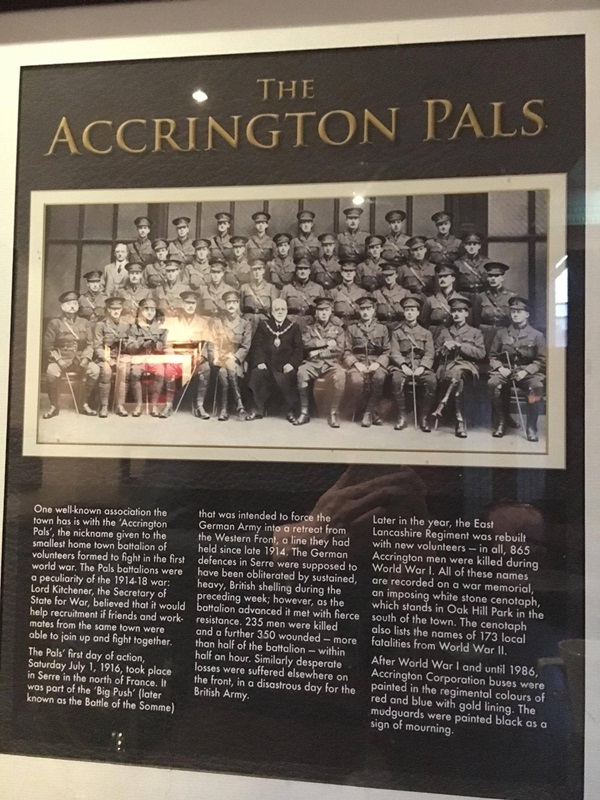
The text reads: One well known association the town has is with the ‘Accrington Pals’, the nickname given to the smallest home town battalion of volunteers formed to fight in the First World War. The Pals battalions were a peculiarity of the 1914-18 war: Lord Kitchener, the secretary of state for war, believed that it would help recruitment if friends and work mates from the same town were able to join up and fight together.
The Pals’ first day of action, Saturday July 1, 1916, took place in Serre in the north of France. It was part of the ‘Big Push’ (later known as the Battle of the Somme) that was intended to force the German Army into a retreat from the Western Front, a line they had held since late 1914. The German defences in Serre were supposed to have been obliterated by sustained, heavy, British shelling during the preceding week; however, as the battalion advanced it met with fierce resistance. 235 men were killed and a further 350 wounded – more than half of the battalion – within half an hour. Similarly desperate losses were suffered elsewhere on the front, in a disastrous day for the British Army.
Later in the year, the East Lancashire Regiment was rebuilt with new volunteers – in all, 865 Accrington men were killed during World War I. All of these names are recorded on a war memorial, an imposing white stone cenotaph, which stands in Oak Hill Park in the south of the town. The cenotaph also lists the names of 173 local fatalities from World War II.
After World War I and until 1986, Accrington Corporation buses were painted in the regimental colours of red and blue with gold lining. The mudguards were painted black as sign of mourning.
A photograph and text about David Lloyd.
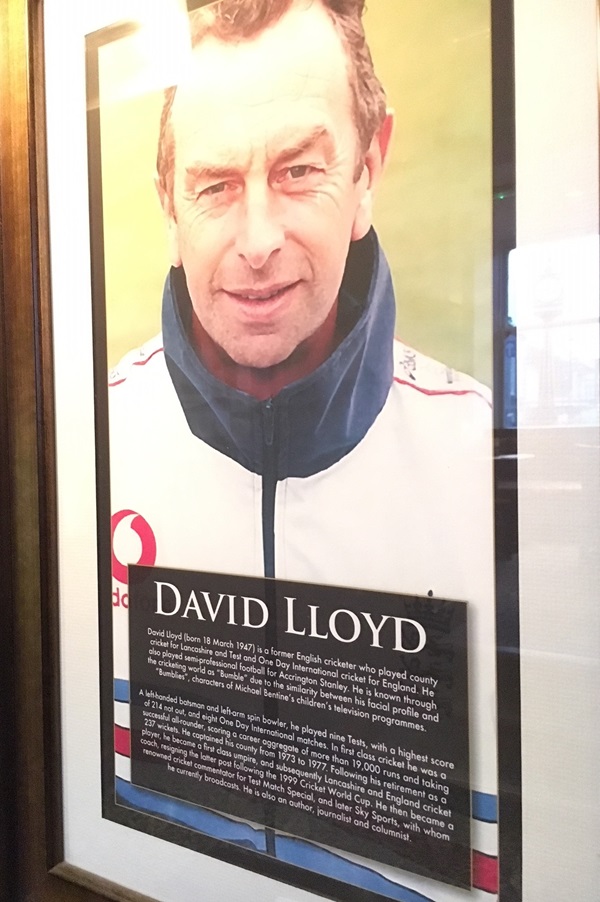
The text reads: David Lloyd (born 18 March 1947) is a former English cricketer who played county cricket for Lancashire and Test and One Day International cricket for England. He also played semi-professional football for Accrington Stanley. He is known through the cricketing world as Bumble due to the similarity between his facial profile and Bumblies, characters of Michael Bentine’s children’s television programmes.
A left handed batsman and left arm spin bowler, he played nine Tests, with a highest score of 214 not out, and eight One Day International matches. In first class cricket he was a successful all-rounder, scoring a career aggregate of more than 19,000 runs and taking 237 wickets. He captained his county from 1973 to 1977. Following his retirement as a coach, resigning the latter post following the 1999 Cricket World Cup. He then became a renowned cricket commentator for Test Match Special, and later Sky Sports, with whom he currently broadcasts. He is also an author, journalist and columnist.
A photograph and text about George Formby and Beryl Ingham.
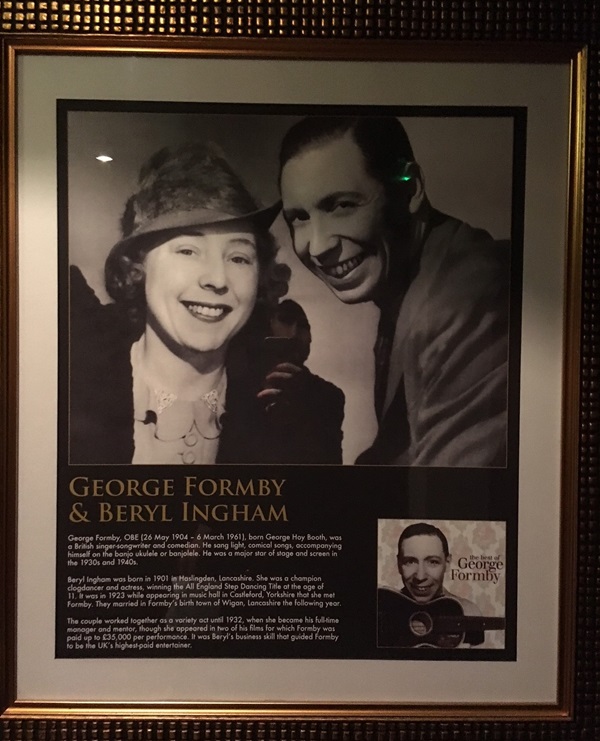
The text reads: George Formby, OBE (26 May 1904 – 6 March 1961), born George Hoy Booth, was a British singer songwriter and comedian. He sang light, comical songs, accompanying himself on the banjo ukulele or banjulele. He was a major star of stage and screen in the 1930s and 1940s.
Beryl Ingham was born in 1901 in Haslingden, Lancashire. She was a champion clogdancer and actress, winning the All England Step Dancing Title at the age of 11. It was in 1923 while appearing in music hall in Castleford, Yorkshire that she met Formby. They married in Formby’s birth town of Wigan, Lancashire the following year.
The couple worked together as a variety act until 1932, when she became his full time manager and mentor, though she appeared in two of his films for which Formby was paid up to £35,000 per performance. It was Beryl’s business skill that guided Formby to be UK’s highest paid entertainer.
External photograph of the building – main entrance.
